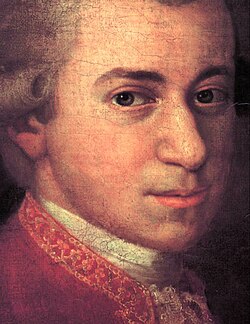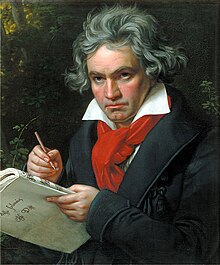In Vienna everything is connected to music, even toilet, where you can enjoy classical works while... you know :)
Today I would like to say a few words about Wiener Klassik - First Viennese School.
This name refers to three composers of the 18ht-century Vienna.
Joseph Haydn
Known from development of chamber music - a form of classical music, composed for a small group of instruments, f.e. piano trio (piano and two other instruments, usually violin and cello).
He was born into a poor family but as teenager he was given the possibility to sing in a choir thanks to his wonderful voice. He also learn to play piano, violin and music theory.
He composed over 100 syphonies, 80 string quartets, operas and masses.
Wolfgang Amadeus Mozart
He was born in Salzburg and lived only 35 years. His father was his first music teacher. From the early age he shown excellent technical skills and music memory; he was said to be 'wonderful child'. Mozart wrote his first composition at the age of 5 and as a teenager he was employed as the official composer of the bishop of Salzburg. However, after a few years he quited this job, since he longed for independency. He became the first independent composer in history and lived in poverty.
He composed over 20 operas, 40 symphonies, 19 masses, many orchestral and piano music, over 100 songs.
Ludwig van Beethoven
He was born in Bonn (Germany). Since childhood he learnd how to play violin and piano. He start composing at the age of 11. When he was 22 he moved to Vienna to study composition, his teacher was Joseph Haydn. Soon he became a recognized composer.
When he was 30 he began to loose hearing and was forced to give up his career as a pianist and conductor. At the age of 45 he was completely deaf but never stopped to compose thanks to his huge theoretical knowledge and 'inner' hearing.
He composed 9 symphonies and many pieces for piano and other instruments.
Today I would like to say a few words about Wiener Klassik - First Viennese School.
This name refers to three composers of the 18ht-century Vienna.
Joseph Haydn
Known from development of chamber music - a form of classical music, composed for a small group of instruments, f.e. piano trio (piano and two other instruments, usually violin and cello).
He was born into a poor family but as teenager he was given the possibility to sing in a choir thanks to his wonderful voice. He also learn to play piano, violin and music theory.
He composed over 100 syphonies, 80 string quartets, operas and masses.
Wolfgang Amadeus Mozart
He was born in Salzburg and lived only 35 years. His father was his first music teacher. From the early age he shown excellent technical skills and music memory; he was said to be 'wonderful child'. Mozart wrote his first composition at the age of 5 and as a teenager he was employed as the official composer of the bishop of Salzburg. However, after a few years he quited this job, since he longed for independency. He became the first independent composer in history and lived in poverty.
He composed over 20 operas, 40 symphonies, 19 masses, many orchestral and piano music, over 100 songs.
Ludwig van Beethoven
He was born in Bonn (Germany). Since childhood he learnd how to play violin and piano. He start composing at the age of 11. When he was 22 he moved to Vienna to study composition, his teacher was Joseph Haydn. Soon he became a recognized composer.
When he was 30 he began to loose hearing and was forced to give up his career as a pianist and conductor. At the age of 45 he was completely deaf but never stopped to compose thanks to his huge theoretical knowledge and 'inner' hearing.
He composed 9 symphonies and many pieces for piano and other instruments.




Komentarze
Prześlij komentarz